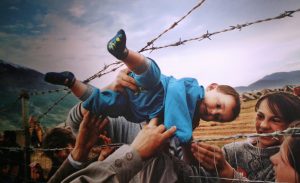Examining MPI's Argument for Increased U.S. Refugee Intake
The Migration Policy Institute is a perennial booster of increased immigration, so it is no surprise that it has issued a new factsheet on U.S. refugee resettlement to suggest that the administration’s announced plan to increase the intake of refugees should be welcomed.

- While noting that the U.S. has “…the largest official resettlement program in the world,…” it is described as “modest” when compared to the current refugee flow to Europe, The trouble with that comparison is that reports indicate that a large share of the arrivals in Europe are not truly refugees, but rather opportunist economic migrants seeking greater opportunity. They are not official refugees in that they are not in the program run by the U.N. High Commission for Refugees.
- In the United States, refugee men are reported to have a higher employment rate than U.S.-born men. That statistic would be meaningful only if the two groups were comparable in age structure. If the share of working age men is larger among the refugees than the U.S.-born men, it is meaningless to cite the percentages. The MPI study ignores this issue.
- The report states, “…most [refugees] quickly become self-sufficient.” To support that assertion, the MPI authors cite the fact that refugees living in the U.S. for at least a decade had a food stamp use of less than 25 percent compared with 11 percent for the U.S.-born, i.e., more than double the U.S.-born rate. And refugees here for 10-20 years have a median income level of 87 percent of the U.S.-born, which makes them unlikely to contribute much in federal taxes.
- The report states that the federal government does not fully cover the costs of refugee resettlement and that NGOs pick up some of the costs. This ignores that local and state governments bear a significant share of the costs – often involuntarily because of required educational outlays and welfare programs where the states have to pay a share of the outlays.
- The report deals with the concern over bringing potential terrorists into the country by citing data that of 784,000 refugees admitted since the 9-11 attack only three have arrested for terrorist activities. Not mentioned is that most of those refugees come from areas where jihadist terrorist activity does not exist. Also not mentioned is that the FBI is tracking “dozens” who are believed to have ties to ISIS, and that there are “certain gaps” in the screening process for refugees according to testimony by FBI director Comey.
- The MPI bottom line is that the U.S. refugee program is successful, thereby implying there should be no problem in expanding it. Not mentioned is that the U.S. resettlement program is costly, so that the expansion announced by the Obama administration implies a major budgetary expansion and additional expenditures by state and local governments.

